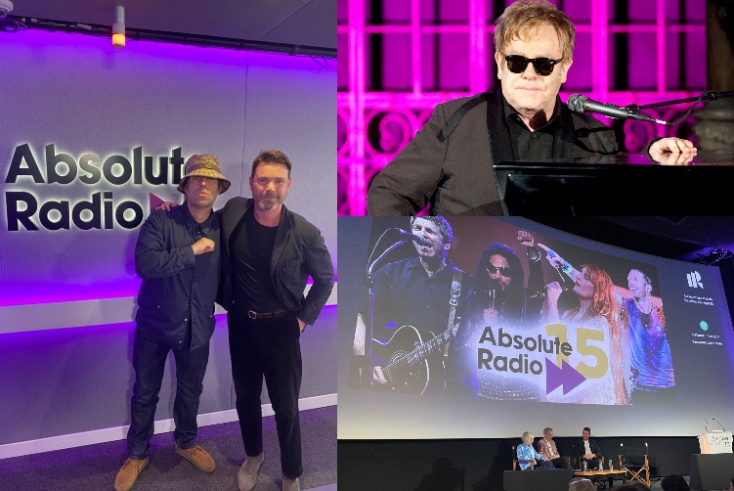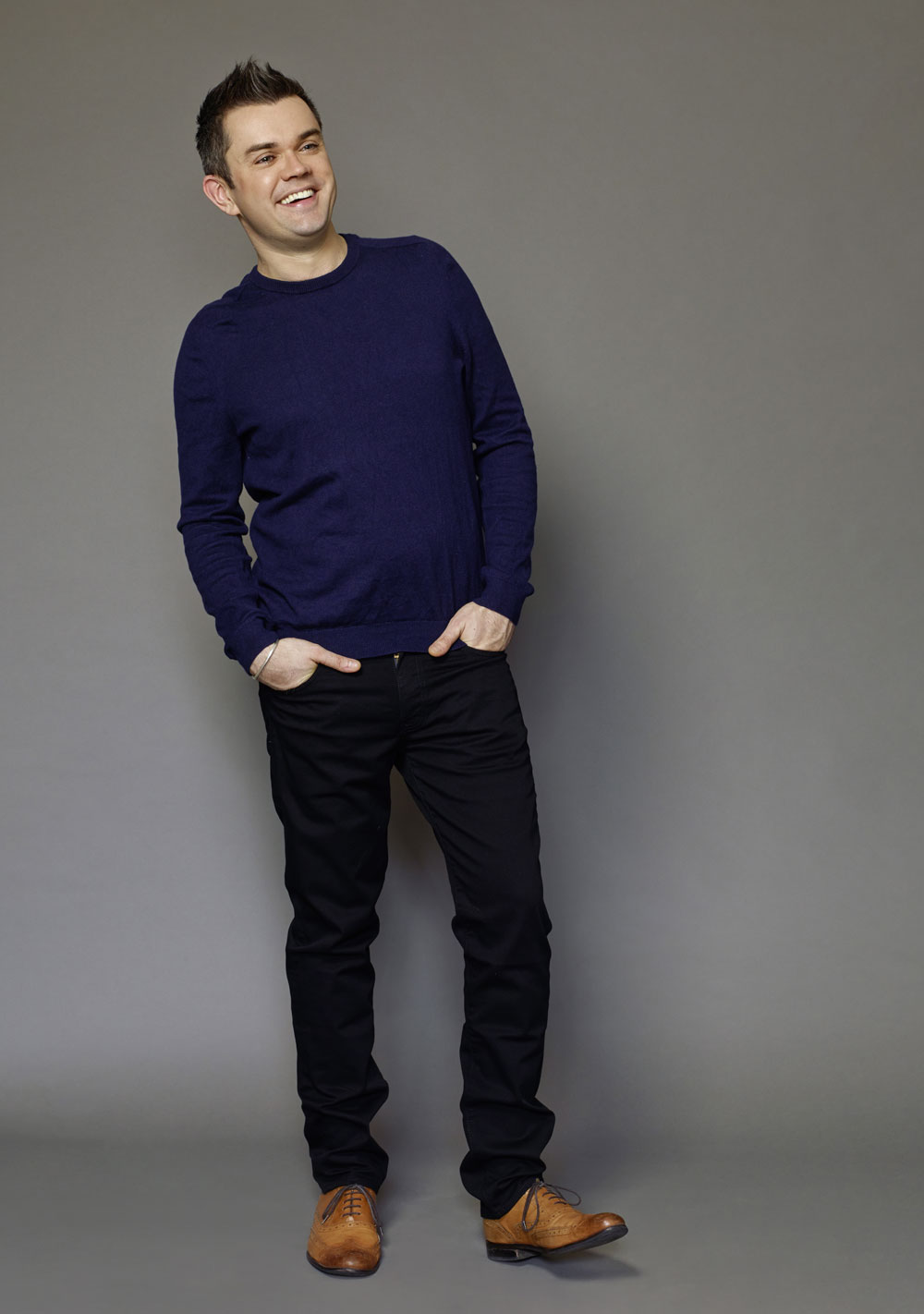Absolute Radio at 15: how the station instituted a ‘game changing’ decade strategy

The Media Leader Interview
Absolute Radio’s director of content speaks about how the Bauer station has evolved over its first 15 years, and why radio should be about “messing about” just as much as platforming real issues.
Absolute Radio turns 15 today and has come a long way from starting life as a radio brand in 2008 after Virgin Radio was rebranded and sold to The Times Group.
Bauer later acquired it in 2013 and turned it into a network with decade and genre stations now including; Absolute Radio, Absolute Classic Rock, Absolute Radio 60s, Absolute Radio 70s, Absolute 80s, Absolute Radio 90s, Absolute Radio 00s, Absolute Radio 10s and Absolute Radio 20s.
Paul Sylvester, director of content at Absolute Radio, joined the station in 2007 as an executive producer, and when he first started working at 1 Golden Square, Absolute was the only radio station in the building.
For him, moving to the new office on Warren Street is “tinged with sadness” because of the history of famous radio broadcasts in the current space, but he tells The Media Leader “the place is creaking” and “everyone is ready to go”.
Targeting ‘reluctant adults’
Sylvester hopes the new purpose built-studios for radio, podcast and video placed next to each other, instead of stacked on top of each other like in the current building, will encourage “more camaraderie” between stations. Although, the current setup has not stopped sharing talent and resources across stations, including producers and presenters “living across more brands,” he says.
He describes that there are a few elements that set Absolute apart from other stations, including audience, tone and music.
He explains: “We moved away quite a long time ago from saying Absolute targets men aged 25-44 because it’s such a ridiculous notion that if you are either outside of that age group or you’re not a man that you would not enjoy what we do, so we talk about our audience being reluctant adults.”
Sylvester says everyone is a reluctant adult in some way, and defines it as someone who used to go to lots of gigs, festivals, comedy shows and be season ticket holders at the football but then “shit happened” with responsibilities like careers, mortgages, marriage and kids. But those people still love the same things they used to do.
Absolute’s tone of voice matches that audience and is very “irreverent”, he says, with the brand centred on being “the home of music and comedy” with comedian presenters including Frank Skinner and Jason Manford, along with a focus on rock and indie music.
‘Game changing’ decade strategy
Absolute was the first to launch a decade station, a strategy which started in 2009 after it had been on air for a year, and which was “a game changer” and “the start of a digital revolution,” according to Sylvester.
It was a choice based on listener demand and to do something different to what other stations were doing at the time with launching “mood” stations like chill and soul.
Absolute 80s launched first and gained a million listeners in two years. This was followed by Absolute 90s six months later, Absolute 00s six months after that, and then Absolute 60s and 70s.
Dave Berry, breakfast presenter at Absolute Radio, jokingly predicted at Radiocentre’s Tuning In conference that in 15 years’ time there would be one breakfast show and 452 playlists on Absolute, without one music genre or subgenre untouched.

Sylvester (pictured, left) comments: “We started with 1.5 million listeners on Absolute, and now we’ve got a network that’s got 5.4 million listeners. A lot of people were worried that [launching decade stations] might cannibalise the audience but it hasn’t in any way, and I think these digital stations are much imitated.”
Absolute turned into a digital-only station earlier this year (receiving a £25,000 fine from Ofcom for doing so before the end of its license period). The station migrated the few that were listening on AM over, as continuing transmitting on AM was “expensive and not sustainable,” stresses Sylvester.
“The biggest growth for all radio is smart speakers. The advent of the smart speaker has been so positive for radio, and radio stations because of the convenience. It has taken the convenience of radio to the nth degree, because you can get what you want from whoever you want at any time and not have to worry about, ‘Do I live in an area where I can receive this radio station?’ It doesn’t matter anymore. Everyone can receive everything,” he says.
Sylvester highlights the two years of Covid lockdowns as “a momentous moment for radio” at a time when TV was falling away, becoming the companion, friend, accompaniment and soundtrack to working from home because it was the quickest to be able to adapt and stay on air.
He says that listening has hybridised, with a cross between habits pre- and post-pandemic. That is especially true when it comes to daytime listening not going away “as much as we all anticipated,” says Sylvester, with evening listening growing and weekend listening higher than pre-Covid.
Premium subscription services and app listening
Another recent milestone saw Absolute launch an ad-free subscription service last year, along with sister station KISS.
Sylvester says: “It’s a really interesting thing for the really passionate listeners, the real core audience who know us and want it. It’s never going to replace traditional radio in that sense, but it’s giving people an option. It’s giving people choice if you want the radio without any ad breaks, if you want even more exclusive stations. For clients and advertisers it has no impact whatsoever, but for our really passionate audience, it’s just something fun for them.”
The premium service has 24/7 playlists as spinoffs from radio shows like Andy Bush’s Disco, and more “tactical” services like Absolute Radio Summer which was the most popular station on Premium in Bauer.
According to Sylvester, the success of Absolute Premium is judged on subscriptions and retentions, and so far it is doing well. Two new “tactical” services will be added by Christmas this year, on top of the recent addition of the “Forgotten 80s”.
Currently, Absolute has a standalone app, which will eventually be rolled into Rayo, which Sylvester says will benefit all stations as they can market themselves to a bigger audience.
He adds, “We’ve still got a long way to go in terms of ensuring everyone knows how useful digital can be in their lives, whether that’s a smart speaker, the new Rayo app that will launch next year, things like Premium. The digital revolution is getting quicker and Absolute succeeded in 15 years by being at the forefront of that from a radio and audio perspective and that’s where we want to be.”
One challenge Sylvester anticipates for radio is continuing to reach younger audiences, but he foresees that “the power of talent and rock-solid nature of radio” will bring “big brands to the fore” along with “surprising stations serving bespoke audiences,” like Boom Radio.
From a commercial perspective, he anticipates an increase in digital, social and video spend around campaigns with integrated talent and that advertisers “will be bigger and bolder with their spends” around radio.
Sylvester highlighted one long-term commercial partner of Absolute Radio, Wickes, as “the benchmark on which most long-term radio partnerships are judged” within Bauer. Sylvester calls it “rare,” as Wickes is willing to take risks and have fun without taking the brand or themselves “too seriously”. Such ambition and trust in the relationship has developed over time, he adds.
What’s next?
In terms of priorities for the near term, Sylvester highlights live music, comedy and charity campaigns as key achievements and future projects, alongside digital and commercial goals.
Previously, Absolute has hosted music acts in unusual venues from Liam Gallagher in Bethnal Green Working Men’s Club to Elton John at the Union Chapel and Elbow in the crypt of the St Paul’s Cathedral. In addition, the radio brand hosts a night of live comedy at the Palladium with Absolute Radio Live to raise money for charity.
Absolute has also been campaigning around having inclusive conversations around mental health for six years, which is “super important” because of the majority of men listening, Sylvester notes. Last month it launched its first female-focussed campaign around period poverty in the UK.
“Radio should be about messing about, it should be about playing away at festivals, but it should also be real. The pandemic has helped us with that.”




